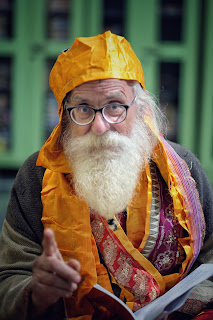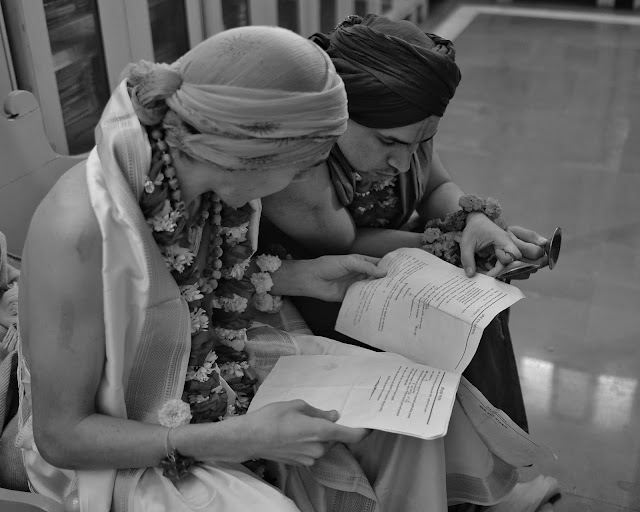Jive Daya Natakam
We have been having our "Christmas break" at Jiva, which is the time when we usually have a group of students from Rutgers University come and spend a couple of weeks taking introduction to Hinduism courses with Babaji. Something possessed me to write a Sanskrit play for my students. We have been working on it during the break and presented it on Jiva Goswami's disappearance day on Jan. 9. It was a lot of fun and I was overjoyed and honored that the students made such an enthusiastic effort.
So for the record, I am cross-posting the article from Vrindavan Today. Those interested can see the Sanskrit text of all five acts on line here. Video on Youtube.
 |
| Jai Radhe Govinda! |
Vrindavan, 2019.01.10 (VT): The 408th disappearance day of Srila Jiva Goswami was celebrated at the Jiva Institute with a short play in the Sanskrit language depicting a portion of his life. The students studying Sanskrit at the Institute were the main actors. The play was called “Jive Daya Natakam”, a play on the words “Compassion to Jiva” and “compassion to all living beings.”
 |
| Gaur-Nitai appear before Jiva Goswami, |
The second act shows his arrival in Vrindavan and entry into the service of Rupa Goswami as the editor of his books.
In the third act, Jiva has an encounter with the arrogant Digvijayi Brahmin, whom he felt had shown disrespect to Rupa Goswami. Rupa is not pleased with Jiva's behavior, which he feels is unbecoming of a Vaishnava in the Holy Dham and banishes him from his service.
 |
| Digvijayi Brahmin after reading Rupa Goswami's manuscript and finding fault with it., |
The final act shows Sanatan arriving in the village of Nandaghat, where Nanda Maharaj was stolen away by Varuna. Begging a roti from a Vrajavasi woman, he learns of the young sadhu practicing difficult tapasya in a nearby gopha. Sanatan goes there and finds that it is indeed Jiva. Rupa appears on the scene and the play finishes with Rupa giving Jiva a blessing, and then Jiva asking them to bless the entire audience that they will get Radharani’s mercy.
Ananda Gopal Dasji Shastri, Vedanta-Nyaya Tirtha, one of the teachers in the Chaitanya Sanskirt Shiksha Sansthan in Radha Kund, graced the performance. Speaking in Sanskrit, Shastriji Maharaj said that he was very pleased that this had been attempted as one rarely, if ever, sees such plays being written or performed anywhere. “It was very impressive to see that the students, many of whom were foreigners and only new to the language, were still able to pronounce so clearly and with such good intonation and feeling," he observed.
The author of the play, Jagadananda Das, who also played the role of the Sutradhar and the Digvijayi Brahmin, said, “The play was written in easy Sanskrit so that the students could learn a more conversational and natural use of the language. It was also important that the audience should be able understand what was being said. So we kept it simple. Many of the people in the audience were Bengali Sanskrit students from Radha Kund and Vrindavan also, so they were able to understand very well. Having an audience that understands is a great help.”
 |
| Jiva Goswami's mother talks to her friends about her son leaving, |
The actors were Malati Manjari Dasi (Germany), Jamie Lessard and Alanah Correia (Canada), Bharat Das and Marky Perez (USA), Maria Christanell (Italy), Willi Muller (Germany), Sujani Dasi (Spain), Jagadananda Das (Canada), Ananda Mohan, Rasamrita, Raghava and Neel Madhava (India).
The drama was well attended by both locals and foreign guests and was filmed by local TV stations.
In the lead up to the presentation, the Mahant of Jiva Institute, Shri Satyanarayana Babaji, addressed the audience. There were several musical interludes, including kirtan at the beginning and end. Afterwards, the guests and actors sat together for a feast.
All photographs by Gregor Schaller. More from this session can be found on my Facebook page.





Comments
A most interesting article:
http://www.academia.edu/35677660/The_elusive_eternal_youth_Feasible_or_just_fantasy
After reading the previous comment; for those wishing to learn more (regarding gomāṃsa) see chapter V (especially verse 74) of the:
Haṭhapradīpikā of Svātmārāma (10 Chapters) With Yogaprakāśikā Commentary by Bālakṛṣṇa.
Edited by Dr. M. L. Gharote and Parimal Devnath
The Lonavla Yoga Institute (India)
ISBN 10: 8190117661 or ISBN 13: 9788190117661
Also, do you receive comments on your posts that were written years ago? If so, I can offer my belated thoughts.
"From it, i.e. from 'Unmeṣa: Lit. Opening of the eye' which is being practised appear in a short time experience like the light of a star in the middle of the two eyebrows ..."
Source:
https://archive.org/details/SpandaKarikasJaidevaSinghMLBD/page/n171
Notes
उन्मेष (un-meṣa), see page 194 of Monier Williams (Un-Mesha):
http://www.sanskrita.org/scans/visor.html?scan=194.gif